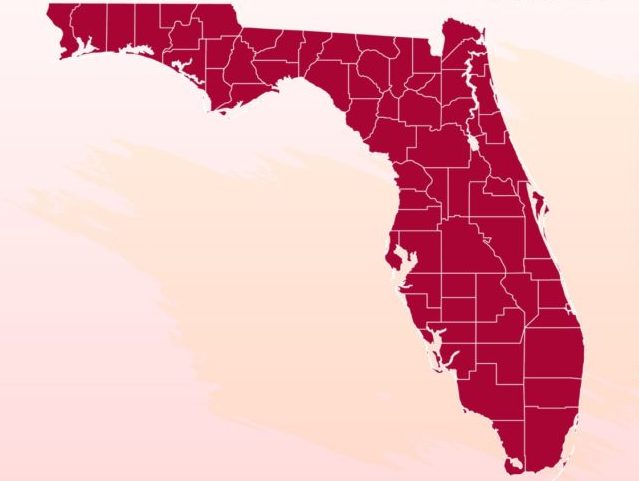The legislative staff of the Florida State Senate Committee on Reapportionment released four draft maps of redistricting plans for congressional and state legislative districts on Wednesday that appear to maintain the status quo in the partisan breakdown of the state’s Congressional delegation.
Dave Wasserman, senior editor, U.S. House of Representatives, of the Cook Political Report tweeted on Wednesday the maps were “Bizarre.”
“[T]hese maps shore up #FL27 Rep. Maria Salazar (R), but otherwise are barely gerrymanders,” Wasserman noted.
“By my count these maps break down 16-12 Trump-Biden, vs. 15-12 today. Is this a head fake?” he added.
After the results of the 2020 Census were released, Florida was one of six states that gained seats in the 435 member U.S. House of Representatives, adding one seat from its current 27 seats to 28 seats that will be up for grabs in the November 2022 midterm elections.
Of the 27 seats from Florida in the U.S. House of Representatives in the current 117th Session of Congress, 16 are now held by Republicans, 10 are held by Democrats, and one is vacant. A special general election will be held on January 11, 2022 in Florida’s 20th Congressional District to fill the seat formerly held by the late Rep. Alcee Hastings (D-FL).
“The staff maps presented are not what we would consider extreme gerrymanders,” Matthew Isbell of MCI Maps, who appears to work primarily for Democrat and left-of center groups, wrote late Wednesday.
For months – MONTHS – someone on twitter had said that the FL GOP have little interest in the lawsuits and depositions that plagued the 2012 redistricting maps. The possibility of a “fair” set of maps – aimed to avoid lawsuits – was a possibility. Seats like the 5th and 10th Congressional were “locked in” and wouldn’t go away.
Hmmmm…. now who was the one saying that……
Well guess what – that is what’s happening.
Isbell tweeted his initial reaction to one of the four plans–Plan 8002–for the 2022 Florida Congressional district boundaries:
The Florida State Senate Committee on Reapportionment staff released a memo to all members of the State Senate on Wednesday stating, “In drawing plans, staff relied on the plain language of the constitution, federal law, and existing judicial precedent to ensure that plans comply with the complex layering of federal and state standards.”
“Senate President Wilton Simpson (R) appointed Sen. Ray Rodrigues (R) as chair of the Senate Committee on Reapportionment on July 2, 2021,” Ballotpedia reported, adding:
In Florida, both congressional and state legislative district lines are drawn by the state legislature. Congressional lines are adopted as regular legislation and are subject to gubernatorial veto. State legislative lines are passed via joint resolution and are not subject to gubernatorial veto. State legislative district maps are automatically submitted to the Florida Supreme Court for approval. In the event that the court rejects the lines, the legislature is given a second chance to draft a plan. If the legislature cannot approve a state legislative redistricting plan, the state attorney general must ask the state supreme court to draft a plan. There are no similar procedures in place for congressional districts.
The Florida Constitution requires that all districts, whether congressional or state legislative, be contiguous. Also, “where doing so does not conflict with minority rights, [districts] must be compact and utilize existing political and geographical boundaries where feasible.” Districts cannot be drawn in such a way as to “favor or disfavor a political party or incumbent.”
Wednesday’s release of four draft redistricting maps is just the beginning of the process that will result in the determination of new boundaries for congressional and state legislative district boundaries.
Interim committee hearings are expected to take place between now and January 11, 2022, when the Florida State Legislature comes back into session. During that 60 day session, both houses will then agree on final boundaries. While the state legislative boundaries are not subject to gubernatorial veto, the congressional district boundaries are subject to a potential veto by Gov. Ron DeSantis (R-FL).
Wednesday’s release of the four draft redistricting maps by the staff of the Florida State Senate Committee on Reapportionment is just the beginning of a process that will take at least two more months until the outcome is known.

COMMENTS
Please let us know if you're having issues with commenting.